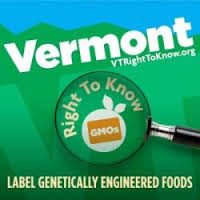Two months ago, I wrote about the lawsuit filed by several food industry trade groups, including the Grocery Manufacturers Association (GMA), to prevent Vermont’s genetically engineered (GE) foods labeling law (“Act 120”) from going into effect on July 1, 2016. That article detailed both sides’ arguments over alleged health and safety concerns of foods made with GE ingredients.
On April 27, 2015, the federal court in that lawsuit made a very significant ruling. First, the court refused to delay implementation of the GE disclosure requirements of Act 120, which is mandated to go into effect July 1, 2016. In this regard, the court held that this requirement simply pertains to the disclosure of a “fact” and that deference was owed to the Vermont General Assembly’s finding that GE foods “potentially pose risks to health, safety, agriculture, and the environment.” Based on these and other findings, the court easily rejected arguments that the GE disclosure requirement was preempted by federal law and that it violated the Commerce Clause and First Amendment of the U.S. Constitution. The only bright spot for the food industry trade groups was the court’s ruling that Act 120’s restriction on “natural” claims was unconstitutional.
Act 120 and the Lawsuit
Act 120 includes two key provisions—a GE disclosure requirement and a restriction on “natural” claims. The first provides that packaged processed food must be labeled with the words: “partially produced with genetic engineering,” “may be produced with genetic engineering” or “produced with genetic engineering.” The second prohibits food companies from using labeling, advertising or signage indicating that a GE food product is “natural,” “naturally made,” “naturally grown,” “all natural” or “any words of similar import that would have a tendency to mislead a consumer.” Significantly, the Vermont General Assembly declared, in its “Findings” related to Act 120, that GE foods “potentially pose risks to health, safety, agriculture and the environment.”
Act 120 is scheduled to go into effect on July 1, 2016. Accordingly, product changes and packaging redesign need to be finalized well before that date to account for lead times in the production and distribution of the products.
Shortly after Act 120 was signed into law on May 8, 2014, GMA, the Snack Food Association, the International Dairy Foods Association and the National Association of Manufacturers (collectively, “Plaintiffs”) filed a lawsuit seeking to strike down the act on a variety of constitutional grounds. At the same time, the Plaintiffs filed a motion for a preliminary injunction asking the court to delay implementation of Act 120 until a full trial on the merits of the Plaintiffs’ claims. In response, the State filed a motion to dismiss each of the Plaintiffs’ claims, arguing that they were all insufficient to state a claim as a matter of law.
The Court’s Ruling
The court ruled on both parties’ motions in an opinion spanning 84 pages that includes highly technical legal arguments. Although the GMA won a victory with respect to Act 120’s restriction on “natural” claims, the court rejected its request to delay implementation of GE labeling requirements. In this regard, the ruling is most notable for its First Amendment analysis, which discusses issues relating to the safety of GE foods and sets a very low bar in determining whether the government’s interest in mandating GE labeling is sufficient to justify compelling commercial speech. The foregoing points are detailed below. As for other aspects of the ruling, the court:
• Granted the State’s motion to dismiss the Plaintiff’s claim that Act 120’s GE disclosure requirement violated the Commerce Clause of the U.S. Constitution
• Granted the State’s motion to dismiss the Plaintiffs’ claim that the GE disclosure requirement is expressly preempted or conflict preempted, in whole or in part, by the Federal Food, Drug and Cosmetic Act and the Nutrition Labeling and Education Act
• Denied the State’s motion to dismiss the Plaintiffs’ claim that both key provisions of Act 120 are expressly preempted under the Federal Meat Inspection Act and the Poultry Products Inspection Act, but noting that the Plaintiffs will need to demonstrate that their members include businesses regulated under these acts
Critical to upholding Act 120’s GE disclosure requirement was the court’s rejection of the Plaintiff’s argument that the requirement creates the impression that GE foods are unsafe or materially different from non-GE foods. In the court’s words, Act 120 “makes no statement regarding food safety, and thus any ‘overall impression’ that GE ingredients are ‘unsafe’ owes nothing to the purely factual information provided by it.” In addition, the court noted that food producers may, if they believe the GE disclosure requirement creates “a negative connotation regarding the safety of GE foods,” disclose additional information to correct “this allegedly erroneous impression.”
Act 120’s GE Disclosure Requirement Upheld
In light of the foregoing findings, the Plaintiffs faced an uphill battle in arguing that the GE labeling requirement violates the First Amendment because it forces companies to say things they don’t want to say and that are allegedly controversial without sufficient justification. In rejecting this argument, the court refused to apply the “strict scrutiny” or “intermediate scrutiny” standard. Instead, the court applied the far more lenient “reasonable relationship” test. Notably, in making this determination, the court stated that, to the extent any purposes or interests of the act “border on appeasement of consumer curiosity,” those requirements “enhance consumer decision making” and thereby further First Amendment interests. In other words, the court was supportive of compelling “factual” information from companies in the context of offering goods to consumers.
Then, in applying the “reasonable relationship” test, the court found a reasonable relationship existed between the compelled speech and the “substantial government interest” of alleged safety concerns of GE foods, along with the asserted purposes of accommodating religious beliefs and practices regarding GE and GE food, promoting “informed consumer decision-making” and addressing “the potential ‘unintended’ consequences from GE food production to non-GE crops and the environment.” And with respect to safety, the court deferred to the Vermont legislature’s findings and rejected the Plaintiffs’ assertion that the alleged harms relating to GE foods were not “real” by noting that, while the Plaintiffs might not find the relevant studies “persuasive,” studies did in fact exist on both sides of the issue.
Ultimately, this ruling suggests that the government could mandate disclosure of any “fact” that consumers express an interest in knowing about with respect to food products. This is a low bar. Significantly, the ruling reflects a lack of clarity from the U.S. Supreme Court on compelled commercial speech cases. Here, the court interpreted a Supreme Court case as providing a more relaxed standard of review when the government is compelling speech as opposed to when it is restricting speech. Other courts, however, have not made such a distinction.
Act 102’s “Natural” Claim Restrictions Rejected
Act 102’s restrictions on “natural” claims, however, were stricken down on First Amendment grounds. In contrast to the GE disclosures, this provision restricts, rather than compels, speech. Accordingly, the court applied “intermediate scrutiny” in its determination. The State argued that it may freely regulate and even ban the use of “natural” and similar words to describe GE food products because that usage is inherently or actually misleading. The State further asserted that GE foods are not “natural” because GE “techniques are, by definition, not ‘brought about by’ or ‘existing in’ nature, but instead are ‘manmade’ and brought about by ‘purposeful interference’ and ‘artificial’ means.”
The court, however, did not accept that argument:
[G]reen houses, fertilizers, pesticides, and even the watering, weeding, and pruning of plants are “manmade,” “purposeful interference” in plant production, not “existing in nature,” and thus can readily and reasonably be deemed an “artificial means” of food production. More particularly, altering seeds and plants from their “natural” state has occurred for centuries through techniques such as selective breeding, hybridization, cross pollination, and grafting. Act 120’s “natural” restriction thus subjects GE manufacturers to a standardless restriction that virtually no food manufacturer could satisfy.
Accordingly, the court found that “the potential benefits of prohibiting the use of undefined terms by only some food manufacturers [who sell GE foods] and the likelihood those benefits will be achieved remains remote, contingent, and speculative, turning almost entirely on how “natural” terminology is defined and which commercial speakers are banned from using it.” Thus, the court held that this restriction violated the First Amendment.
The “natural” claims restriction was also ejected as a violation of the Commerce Clause of the U.S. Constitution. In this regard, the court observed that, “Without limitation and for no stated purpose, Act 120 purports to prohibit GE manufacturers’ use of “natural” terminology in signage and advertising regardless of where or how those activities take place.” Thus, the provision impermissibly regulated commerce outside of Vermont.
Conclusion
For obvious reasons, this ruling has severe implications for all food companies involved with producing food with GE ingredients. Although there are weaknesses in the court’s ruling and the Plaintiffs will likely move quickly to appeal the ruling, the appeals process will likely last 2 years. By that time, food companies will already need to comply with the GE labeling requirement. Accordingly, food companies will have to move forward now with plans for how to label GE foods sold in Vermont.
David L. Ter Molen is partner and member of the Food Industry Team at Freeborn & Peters LLP (Chicago).
>



